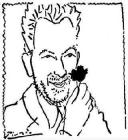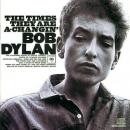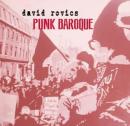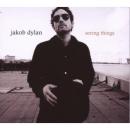Now that they are gone, you know, the truth it can be told;
They were sacrificial lambs in the market place sold --
Julius and Ethel, Julius and Ethel.
Now that they are gone, you know, the truth it can come out;
They were never proven guilty beyond a reasonable doubt --
Julius and Ethel, Julius and Ethel.
The people said they were guilty at the time;
Some even said there hadn't a-been any crime --
Julius and Ethel, Julius and Ethel.
People look upon this couple with contempt and doubt,
But they loved each other right up to the time they checked out --
Julius and Ethel, Julius and Ethel.
Eisenhower was president, Senator Joe was king;
Long as you didn't say nothing you could say anything --
Julius and Ethel, Julius and Ethel.
Now some they blamed the system, some they blamed the man;
Now that it is over, no one knows how it began --
Julius and Ethel, Julius and Ethel.
Every kingdom got to fall, even the Third Reich;
Man can do what he pleases but not for as long as he like --
Julius and Ethel, Julius and Ethel.
Well, they say they gave the secrets of the atom bomb away;
Like no one else could think of it, it wouldn't be here today --
Julius and Ethel, Julius and Ethel.
Someone says the fifties was the age of great romance;
I say that's just a lie, it was when fear had you in a trance --
Julius and Ethel, Julius and Ethel.
They were sacrificial lambs in the market place sold --
Julius and Ethel, Julius and Ethel.
Now that they are gone, you know, the truth it can come out;
They were never proven guilty beyond a reasonable doubt --
Julius and Ethel, Julius and Ethel.
The people said they were guilty at the time;
Some even said there hadn't a-been any crime --
Julius and Ethel, Julius and Ethel.
People look upon this couple with contempt and doubt,
But they loved each other right up to the time they checked out --
Julius and Ethel, Julius and Ethel.
Eisenhower was president, Senator Joe was king;
Long as you didn't say nothing you could say anything --
Julius and Ethel, Julius and Ethel.
Now some they blamed the system, some they blamed the man;
Now that it is over, no one knows how it began --
Julius and Ethel, Julius and Ethel.
Every kingdom got to fall, even the Third Reich;
Man can do what he pleases but not for as long as he like --
Julius and Ethel, Julius and Ethel.
Well, they say they gave the secrets of the atom bomb away;
Like no one else could think of it, it wouldn't be here today --
Julius and Ethel, Julius and Ethel.
Someone says the fifties was the age of great romance;
I say that's just a lie, it was when fear had you in a trance --
Julius and Ethel, Julius and Ethel.
inviata da Riccardo Venturi - 19/10/2005 - 22:46
Lingua: Italiano
JULIUS E ETHEL
Ora che son morti lo sai che la verità può essere rivelata
Furono agnelli sacrificali venduti al mercato
Julius ed Ethel, Julius ed Ethel
Ora che son morti lo sai che la verità può saltar fuori
Non è mai stata provata la loro colpevolezza al di là di ogni ragionevole dubbio
Julius ed Ethel, Julius ed Ethel
La gente pensò che erano colpevoli all'epoca
Qualcun altro disse persino che non c'era stato alcun crimine
Julius ed Ethel, Julius ed Ethel
La gente guardò a questa coppia con disprezzo e dubbio
Ma loro si amarono fino al momento in cui dovettero pagare il conto
Julius ed Ethel, Julius ed Ethel
Eisenhower era presidente, il Senatore Joe era Re
Purchè tu non dicessi nulla potevi dire tutto
Julius ed Ethel, Julius ed Ethel
Ora alcuni incolparono il sistema, altri incolparono la persona
Ora che è finita, nessuno sa com'è iniziata
Julius ed Ethel, Julius ed Ethel
Ogni Regno è destinato a cadere, persino il Terzo Reich
L'uomo può fare a suo piacimento ma non tanto a lungo quanto vorrebbe
Julius ed Ethel, Julius ed Ethel
Beh, dissero che avevano venduto al nemico i segreti per costruire la Bomba Atomica
Come se nessuno avesse potuto pensarci, la bomba non sarebbe qui ora
Julius ed Ethel, Julius ed Ethel
Qualcuno dice che gli anni cinquanta sono stati l'epoca del grande romanticismo
Io dico che è tutta una bugia, era quando la paura ti teneva in stato di ipnosi
Julius ed Ethel, Julius ed Ethel
Ora che son morti lo sai che la verità può essere rivelata
Furono agnelli sacrificali venduti al mercato
Julius ed Ethel, Julius ed Ethel
Ora che son morti lo sai che la verità può saltar fuori
Non è mai stata provata la loro colpevolezza al di là di ogni ragionevole dubbio
Julius ed Ethel, Julius ed Ethel
La gente pensò che erano colpevoli all'epoca
Qualcun altro disse persino che non c'era stato alcun crimine
Julius ed Ethel, Julius ed Ethel
La gente guardò a questa coppia con disprezzo e dubbio
Ma loro si amarono fino al momento in cui dovettero pagare il conto
Julius ed Ethel, Julius ed Ethel
Eisenhower era presidente, il Senatore Joe era Re
Purchè tu non dicessi nulla potevi dire tutto
Julius ed Ethel, Julius ed Ethel
Ora alcuni incolparono il sistema, altri incolparono la persona
Ora che è finita, nessuno sa com'è iniziata
Julius ed Ethel, Julius ed Ethel
Ogni Regno è destinato a cadere, persino il Terzo Reich
L'uomo può fare a suo piacimento ma non tanto a lungo quanto vorrebbe
Julius ed Ethel, Julius ed Ethel
Beh, dissero che avevano venduto al nemico i segreti per costruire la Bomba Atomica
Come se nessuno avesse potuto pensarci, la bomba non sarebbe qui ora
Julius ed Ethel, Julius ed Ethel
Qualcuno dice che gli anni cinquanta sono stati l'epoca del grande romanticismo
Io dico che è tutta una bugia, era quando la paura ti teneva in stato di ipnosi
Julius ed Ethel, Julius ed Ethel
inviata da Riccardo Venturi - 19/10/2005 - 22:49
×
![]()








Lyrics and Music by Bob Dylan
Testo e musica di Bob Dylan
Outtake di "Infidels"
Lyrics as recorded by Bob Dylan, The Power Station, New York, NY, 11 Apr-8 May 1983
© 1983
Transcribed by Manfred Helfert
A puffy, spectacled native New Yorker with a smudge-sized mustache and disappearing black hair, Rosenberg was the fourth U.S. citizen arrested in the atomic spy roundup that began after the arrest of British Physicist Klaus Fuchs. The FBI said Rosenberg had been an important cog in the machinery, working directly under Anatoli Yakovlev, Soviet vice consul in New York. An electrical engineer (C.C.N.Y., class of '39), Rosenberg had been an inspector for the War Department's Signal Service until early 1945, when he was fired for Communist affiliations. He broke off all open contracts with the party, quit subscribing to the Daily Worker and set up as the owner of a small, non-union machine shop in Manhattan. But the FBI kept its many eyes on him.
It was he, said the FBI, who recruited his brother-in-law, David Greenglass, for the spy ring when Greenglass was on furlough from his sergeant's duties at the Los Alamos A-bomb project. Rosenberg tore the top of a Jello box in half, gave a piece to Greenglass as his badge of identification and told him that his contact at Los Alamos would produce the other half. The contact turned out to be Spy Courier Harry Gold, the Philadelphia chemist, who got atomic-energy data from Greenglass and paid him $500.
After the arrest of Fuchs and Gold, said the FBI, Rosenberg told Greenglass to leave the country and report to the Soviet embassy in Czechoslovakia; he gave him "substantial funds in 20-dollar bills" to do so (reportedly $5,000). But before he could get away, the FBI got Greenglass, and he talked. Julius Rosenberg was not surprised when the FBI came for him.
Alone of the four arrested so far, Rosenberg stoutly insisted on his innocence. The FBI's story, said he, was "fantastic--something like kids hear on the Lone Ranger program." Three days after Rosenberg's arrest, Harry Gold pleaded guilty in federal court to all the FBI's charges.
TIME, 31 July 1950
*
Judge Irving Kaufman looked down at the man and woman before him. "Plain, deliberate, contemplated murder is dwarfed in magnitude by comparison with the crime you have committed," he told Julius and Ethel Rosenberg in a hoarse, faint voice. "I believe your conduct in putting into the hands of the Russians the A-bomb...has already caused the Communist aggression in Korea...and who knows but that millions more of innocent people may pay the price of your treason."
"I have deliberated for hours, days and nights," said Judge Kaufman. "I have searched my conscience to find some reason for mercy. I am convinced, however, that I would violate the solemn and sacred trust that the people of this land have placed in my hands were I to show leniency... The sentence of the court upon Julius and Ethel Rosenberg is that, for their crime, they are sentenced to death."
Sallow Julius Rosenberg and his wife were led away. Later, in their adjoining cells, the Rosenbergs sang to each other: her choice was Puccini's One Fine Day, his The Battle Hymn of the Republic.
There would be appeals. But though higher courts may reverse the conviction, none may reduce the sentences. If the sentences are carried out, the Rosenbergs will be the first spies ever executed by order of the U.S. civil court.
TIME, 16 April 1951
Caso Rosenberg
Julius Rosenberg (New York, 12 maggio 1918 - Penitenziario di Sing Sing, Ossining, 19 giugno 1953) è stato un simpatizzante comunista statunitense di religione ebraica che fu al centro di un caso che - negli anni della Guerra fredda, con la forte contrapposizione dei blocchi occidentale ed orientale, ed in pieno maccartismo - colpì l'opinione pubblica mondiale quando venne processato assieme alla moglie Ethel, giudicato colpevole e condannato a morte come spia dell'Unione Sovietica. La medesima sorte toccò alla consorte di Rosenberg.
L'accuratezza delle imputazioni è rimasta sempre controversa, sebbene decenni dopo, la decifrazione delle comunicazioni sovietiche da parte del progetto VENONA è divenuta disponibile sul piano pubblico indicando, almeno apparentemente, che Julius Rosenberg era attivamente coinvolto nello spionaggio (malgrado non venissero fornite nuove prove in grado di dimostrare gli specifici atti di spionaggio per i quali era stato riconosciuto colpevole).
Specificamente, Rosenberg e la moglie Ethel (anch'essa riconosciuta colpevole e giustiziata assieme al marito), furono accusati di cospirazione attraverso spionaggio e incriminati per aver passato segreti sulle armi nucleari ad agenti sovietici.
L'indagine che portò Rosenberg e la moglie alla sedia elettrica nel penitenziario di Sing Sing, nello stato di New York, il 19 giugno del 1953, aveva preso l'avvio poco più di due anni prima, dapprima con la denuncia, il 6 marzo del 1951, e quindi con l'arresto, il 29 marzo successivo.
Rosenberg si era laureato nel 1939 ingegnere elettrico; l'anno successivo si arruolò nell'esercito come addetto ai radar. Nel 1940, allo scoppio della seconda guerra mondiale, divenne capo della Lega dei giovani comunisti. All'interno della stessa associazione aveva conosciuto, nel 1936, la futura moglie, Ethel.
Ethel Rosenberg nacque il 28 settembre del 1915, anch'essa a New York. Aspirante attrice e cantante, dovette però accontentarsi di un impiego in una società di shipping. Interessata alle lotte sindacali, aderì alla Lega dei giovani comunisti. La vicenda giudiziaria che riguardò i coniugi Rosenberg prese le mosse proprio da testi sospetti battuti a macchina dalla giovane segretaria.
I Rosenberg, durante il loro matrimonio, ebbero due figli.
In loro nome è stato istituito nel 1990 un Fondo - il Rosenberg Fund for Child (oltre diecimila gli associati) - che si occupa dell'assistenza e del recupero dei figli dei perseguiti per attivismo politico.
Il medesimo anno in cui i due coniugi furono giustiziati, il pittore Renato Guttuso immortalò i loro volti in un disegno a matita su carta, titolandolo semplicemente Julius ed Ethel Rosenberg.
Il cantante Bob Dylan, dal canto suo, compose su di loro una delle sue prime canzoni, Julius and Ethel.
Caso Rosenberg - Wikipedia